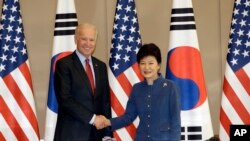U.S. Vice President Joe Biden met with South Korean President Park Geun-Hye on the lastest stop of an Asian tour dominated by tensions over China's new Air Defense Identification Zone, or ADIZ.
Biden said at the presidential Blue House in Seoul on Friday that there should be no doubt about Washington's commitment to preserving balance in the region. Biden told reporters that "the United States never says anything it does not do."
At a working lunch, President Park spoke about regional issues, including territorial disputes with China, the threat from North Korea and diplomatic tensions with Japan.
Biden arrived in Seoul from Beijing, where he said China's ADIZ has created "significant apprehension" in the region.
The U.S., Japan and South Korea have all rejected the new zone in the East China Sea.
China says the zone is in accordance with international law and that the U.S. should take an "objective and fair attitude" about it.
Biden told a group of U.S. business leaders in Beijing Thursday he was "very direct" about the matter during his talks with Chinese President Xi Jinping. The vice president also pointed out that conflict between Beijing and Washington was not inevitable, despite occasional disagreements.
Seoul is the last stop on Biden's week-long Asia tour.
On his first stop, in Japan, Biden suggested establishing "confidence building measures, including emergency communications channels" to help reduce tensions.
The U.S., Japan, and South Korea have all sent military planes to the region in recent days, defying China's demand that they notify Beijing beforehand.
China has not interfered with the flights, but has scrambled fighter jets to the area, heightening concerns about a possible miscalculation in the air.
Biden said on Thursday that China must take steps "to reduce the risk of accidental conflict and miscalculation," and refrain from making moves that increase tension.
He also addressed other issues of contention between the U.S. and China. Specifically, he spoke of a "profound disagreement" over China's treatment of U.S. journalists.
Many U.S. and other foreign journalists have complained of restrictions following their publication of material that offended Beijing. Some have called for U.S. officials to address the matter with Chinese leaders.
When asked about Biden's comments, Chinese foreign ministry spokesman Hong Lei said China "has always managed foreign reporters and media in accordance with rules and the law," and that it has provided an "extremely convenient atmosphere" for them in recent years.
Biden said at the presidential Blue House in Seoul on Friday that there should be no doubt about Washington's commitment to preserving balance in the region. Biden told reporters that "the United States never says anything it does not do."
At a working lunch, President Park spoke about regional issues, including territorial disputes with China, the threat from North Korea and diplomatic tensions with Japan.
Biden arrived in Seoul from Beijing, where he said China's ADIZ has created "significant apprehension" in the region.
The U.S., Japan and South Korea have all rejected the new zone in the East China Sea.
China says the zone is in accordance with international law and that the U.S. should take an "objective and fair attitude" about it.
Biden told a group of U.S. business leaders in Beijing Thursday he was "very direct" about the matter during his talks with Chinese President Xi Jinping. The vice president also pointed out that conflict between Beijing and Washington was not inevitable, despite occasional disagreements.
Seoul is the last stop on Biden's week-long Asia tour.
On his first stop, in Japan, Biden suggested establishing "confidence building measures, including emergency communications channels" to help reduce tensions.
The U.S., Japan, and South Korea have all sent military planes to the region in recent days, defying China's demand that they notify Beijing beforehand.
China has not interfered with the flights, but has scrambled fighter jets to the area, heightening concerns about a possible miscalculation in the air.
Biden said on Thursday that China must take steps "to reduce the risk of accidental conflict and miscalculation," and refrain from making moves that increase tension.
He also addressed other issues of contention between the U.S. and China. Specifically, he spoke of a "profound disagreement" over China's treatment of U.S. journalists.
Many U.S. and other foreign journalists have complained of restrictions following their publication of material that offended Beijing. Some have called for U.S. officials to address the matter with Chinese leaders.
When asked about Biden's comments, Chinese foreign ministry spokesman Hong Lei said China "has always managed foreign reporters and media in accordance with rules and the law," and that it has provided an "extremely convenient atmosphere" for them in recent years.





